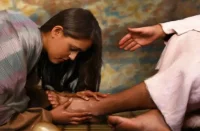Times of relative peace and prosperity are far more rare than we realize. Our present difficulties reflect stresses and strains that have been common in many parts of the world and through time. I have found some comfort in reading lives and stories from those times and places, particularly those accounts that point towards a reminder that God is always and everywhere at work for our good.
Recently, I returned to a small book that is a treasure. Written by the Orthodox theologian, Vladimir Lossky, it is an account of his flight from the invasion of the Nazis into France in 1940. The speed of the German Blitzkrieg caught France unaware. Twenty-five years earlier, the First World War had been a quagmire of trenches and static positions. In 1940, France fell in six weeks, together with Luxembourg, Belgium, and the Netherlands. Things moved so quickly that refugees were unable to stay ahead of the invading army.
Lossky’s Seven Days on the Roads of France is remarkable both in its detailed descriptions of that journey as well as his own reflections. It was not his first flight from trouble. Together with his father, the philosopher, Nicholas Lossky, he was exiled from the Soviet Union in 1922, living first in Prague before eventually migrating to Paris.
 I was struck by his love for France and his ability as an Orthodox thinker to find deep affinities with its history and the Christianity that had once flourished there. A poignant scene is described as Lossky visited the Cathedral in Orleans. Looking for the relics of St. Aignan whose prayers had once turned back invading Huns, he instead encountered an elderly gentleman who was scolding the statues of various saints. “Alors, quoi? Damn it all, then! Don’t you want to help us? Cant you help us?”
I was struck by his love for France and his ability as an Orthodox thinker to find deep affinities with its history and the Christianity that had once flourished there. A poignant scene is described as Lossky visited the Cathedral in Orleans. Looking for the relics of St. Aignan whose prayers had once turned back invading Huns, he instead encountered an elderly gentleman who was scolding the statues of various saints. “Alors, quoi? Damn it all, then! Don’t you want to help us? Cant you help us?”
He himself offered a rumination about the state of the world. Driven from Russia through the work of the extreme Left, he was now fleeing the work of the extreme Right. He wrote:
Revolutionaries are always in the wrong, since, in their juvenile fervor for everything new, in their hopes for a better future, and a way of life built on justice, they always base themselves on theories that are abstract and artificial, making a clean sweep of living tradition which is, after all, founded on the experience of centuries.
Conservatives are always wrong, too, despite being rich in life experience, despite being shrewd and prudent, intelligent and skeptical. For, in their desire to preserve ancient institutions that have withstood the test of time, they decry the necessity of renewal, and man’s yearning for a better way of life.
Both attitudes carry within themselves the seeds of death. Is there, then, a third way? Another destiny for society than of always being subject to the threat of revolutions which destroy life, or reactionary attitudes which mummify it? Or is this the inevitable fate of all terrestrial cities, the natural law of their existence?
In fact, only in the Church can we find both a Tradition that knows no revolution and at the same time the impetus towards a new life that has no end. Her theory (understood in the true sense of the word, namely “vision”) is based on a constant experience of Truth. Which is why she is in possession of those infinite resources upon which may draw all who are called to govern the perishable cities of this world.
Those are profound thoughts during a time of chaos – a remembrance of what alone is true and just.
Plagues and politics, like wars and famines, do not generally make for cogent ruminations. Many days, I find it difficult to get beyond the slough of my own lethargy and the world’s noisy slouching towards some yet darker moment. We have lost nothing that is eternal. The reduced attendance at the Church and the sacramental discomfort we have endured will pass. The Archbishop of my diocese just relaxed some of our restrictions and we are allowed to kiss the icons again. The epitaphion of the Virgin was in the center of the Church, resting there in the afterfeast of the Dormition. My kiss was less perfunctory today, and filled with deeper gratitude. Kisses seem sweeter now.
Lossky survived the War, along with his family, and returned to teach in Paris. He lived until 1958, when he passed suddenly from a heart attack. He was but 55 years old. His book, The Mystical Theology of the Eastern Church, written during the war, was translated and published in English the year before his death. It was the first work of a modern Orthodox writer that I ever read. The journey that began for me with that book lasted far more than seven days.
Now that I think about it, his great classic work makes no mention of the times or the stresses within his life. It is timeless. Indeed, something that struck me most about the book was that I often was unable to tell when he was quoting from the Fathers and when he was himself was speaking. As such, it was the food of eternity. A man could walk very far, indeed, on such fare.
Source: Glory To God For All Things














Comments